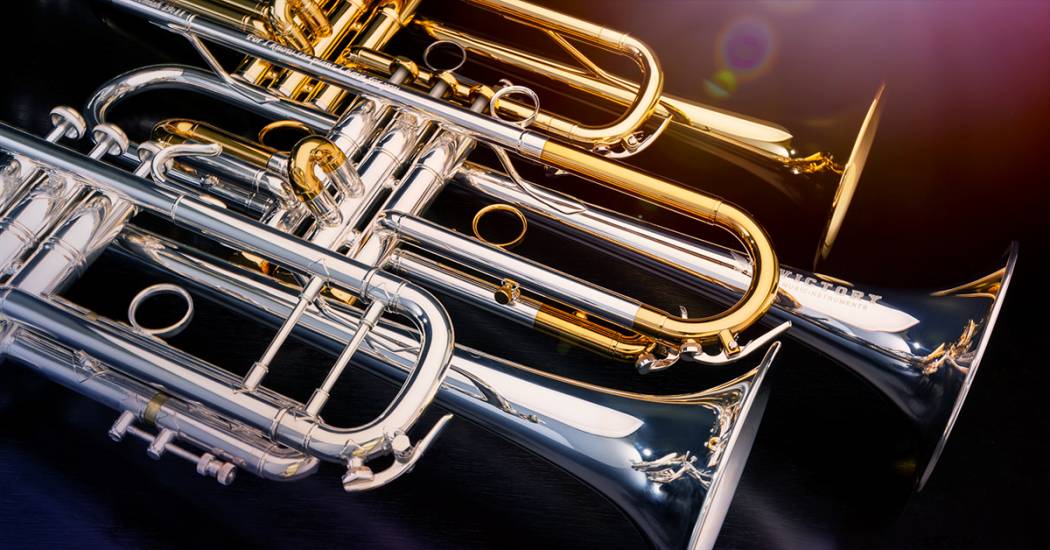
Whether you’re a first-time trumpet player or you’ve been playing for years and are looking to upgrade to a new instrument, Sweetwater’s Trumpet Rental and Buying Guide can help you select the right instrument to fit your needs.
Like all instruments, the quality of a trumpet’s sound is most reliant on the technique of the player. Yet, many factors influence the tonal character of a trumpet, including the materials and methods used in crafting the instrument. In this guide, we’ll cover the following topics:
- What Are the Parts of a Trumpet?
- What Materials Are Trumpets Made From?
- What Are the Differences Between Beginner, Intermediate, and Professional Trumpets?
- What Other Instruments Are in the Trumpet Family?
- Trumpet Rental: Why and How to Rent a Trumpet
What Are the Parts of a Trumpet?
The most common trumpet is the Bb trumpet. However, there are other varieties of trumpets, including C trumpets, D trumpets, and Bb pocket trumpets. These are highly specialized instruments that are outside the scope of this buying guide.
A Bb trumpet is a complex instrument made up of several sections that feature numerous parts.
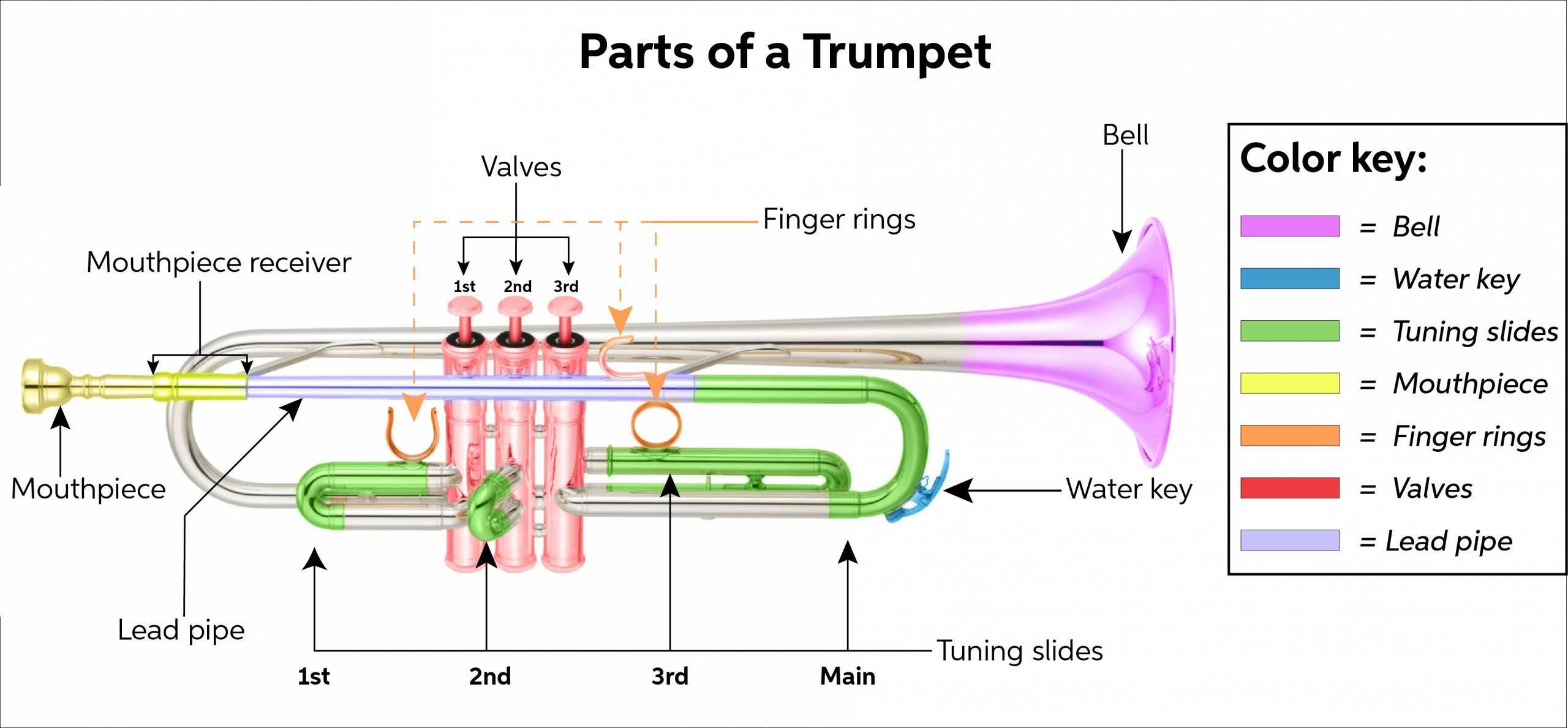
Leadpipe
The leadpipe of a trumpet receives the mouthpiece and runs to the first tuning slide. In most cases, it is permanently fixed to the instrument. Leadpipes come in standard and reverse variations. When you’re looking at product pages for trumpets, those with reverse leadpipes will typically be noted. If a trumpet does not say that it comes with a reverse leadpipe, then it’s safe to assume that it has a standard leadpipe.
What’s the difference between a standard leadpipe and a reverse leadpipe?
A standard leadpipe fits into the tuning slide. With a reverse leadpipe, the tuning slide fits into the leadpipe. One is not better than the other, but they do have different characteristics.
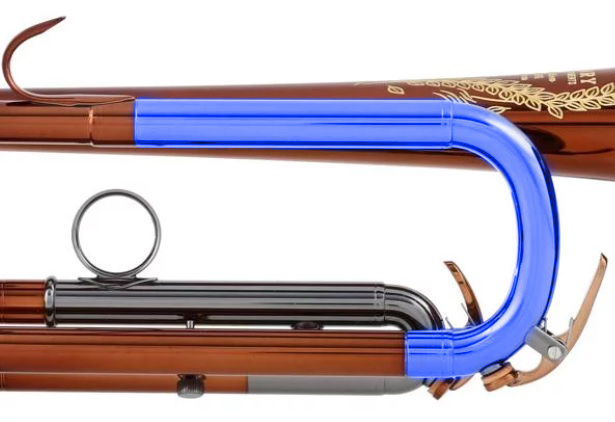
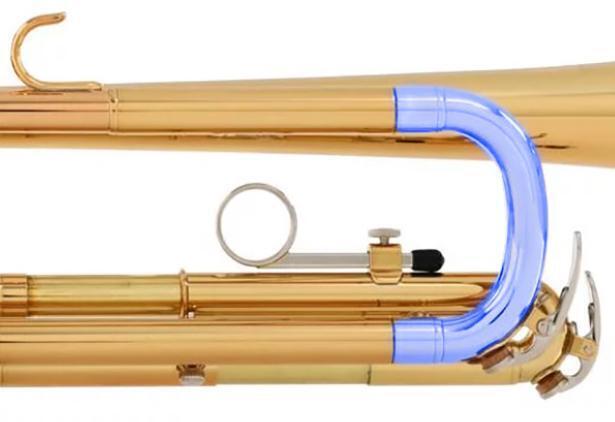
First, reverse leadpipes are noticeably longer than standard leadpipes. Second, because the tuning slide fits into the leadpipe, there isn’t a point at which the diameter of the tube is reduced. Together, these two factors provide less air resistance and facilitate more consistent intonation.
However, some players may prefer the slight resistance they get with a standard leadpipe, which can make it easier to play consistently at loud volumes while delivering a crisper attack and more precise articulations. Ultimately, the choice between a trumpet with a standard or a reverse leadpipe comes down to player preference. However, it shouldn’t be a concern when you’re purchasing a student trumpet since most student trumpets will feature a standard leadpipe.
Tuning slides and valves
The pitch of a trumpet is dependent on three things:
- The amount (or volume) of air being blown through the instrument
- How fast a player’s lips vibrate (higher notes can require more than 1,000 vibrations per second!)
- The length of the tubing, which a player alters by adjusting a slide or by pressing the valves. The shorter the tube, the higher the pitch — and vice versa.
Slides
Trumpets have four slides: the main tuning slide and one tuning slide for each of the instrument’s three valves.
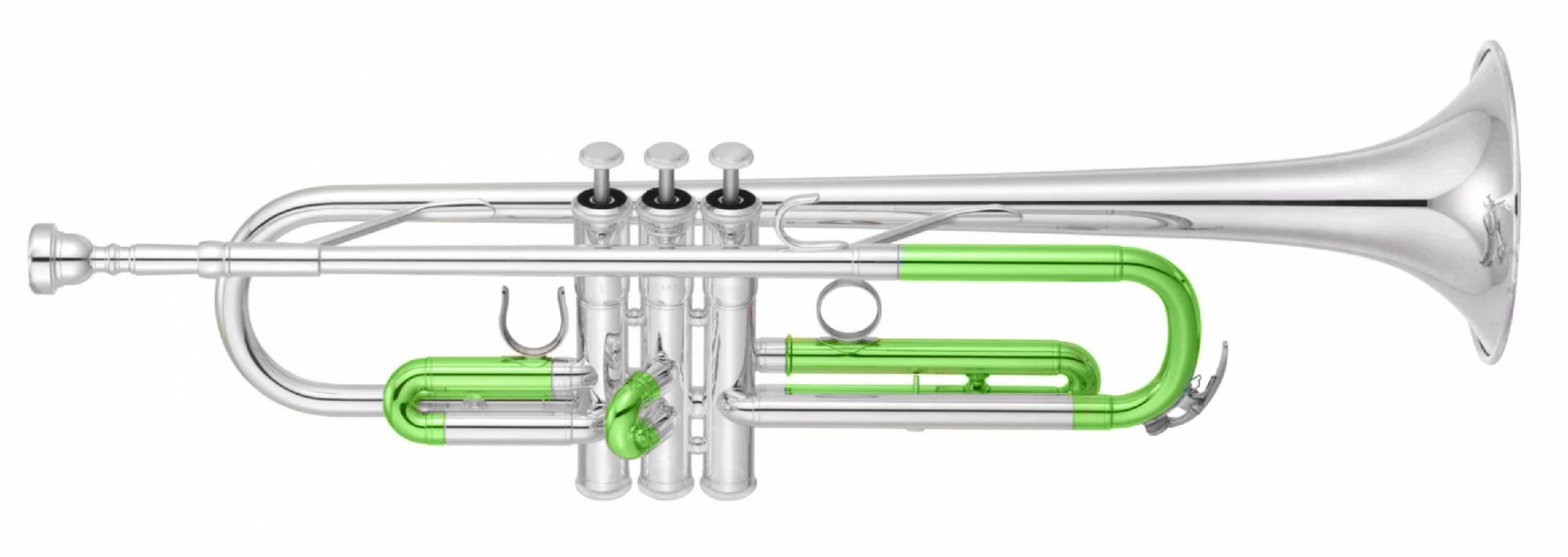
The main tuning slide is the largest, and it’s used to set the general tuning of the trumpet. If the trumpet is flat, then you extend the slide; if the trumpet is sharp, then you shorten the slide. The three valve slides are used for micro-adjustments of individual notes, and the first and third valve slides include slide rings for on-the-fly adjustments during performances.
Why do you need to adjust the tuning slides during a performance? Because, even on professional trumpets, some notes will be consistently out of tune due to numerous variables outside the scope of this buying guide. However, with experience, you’ll learn how to make the appropriate adjustments to the tuning slides so that your instrument sounds its best!
Valves
A trumpet has three valves that work in an on/off fashion. Pressing a valve increases the overall tube length by a set amount: 160mm for the first valve, 70mm for the second valve, and 270mm for the third valve. These lengths are specifically chosen because they change the pitch of a note by a set interval. The first valve lowers a note by one whole tone; the second valve lowers a note by one semitone; the third valve lowers a note by one whole tone plus one semitone. This configuration presents seven different tube lengths, enough to give players access to every sharp and flat in the trumpet’s range.
Trumpets primarily use piston valves. However, there are some professional-model trumpets with rotary valves, which are what you would find on a French horn. Since rotary valves are relatively uncommon on trumpets, we’ll focus our attention on piston valves.
Valve material
After the mouthpiece, valves are the most important way that a player interacts with the instrument. Therefore, when buying a trumpet, it’s important to choose one with well-constructed, reliable valves.
Valves are made from three main materials: nickel-plated nickel silver, Monel (an alloy of nickel, copper, and manganese), and stainless steel.
Nickel-plated valves are generally found on student instruments, and Monel and stainless-steel valves are available on student, intermediate, and professional instruments. Monel has comparable hardness to plated nickel silver without the need for plating. That means you won’t have to worry about flaking, which can happen with nickel-plated valves. Monel is also more resistant to corrosion than nickel. However, due to an electrolytic reaction, Monel valves will sometimes develop a greenish buildup. Stainless-steel valves, like Monel, do not require plating, and, since stainless steel is a harder alloy, it can be manufactured to very tight tolerances, potentially improving the intonation of an instrument.
How much does the valve material matter?
For beginning players, the differences are relatively insignificant. What’s more important is how well the valves are built. One of the common issues in cheaper student instruments is valves that are gummy or that seize up. That said, Sweetwater only carries the highest-quality student instruments, which, with proper maintenance, will serve your student musician well during the first steps of their musical journey.
Bell
Simply put, the bell is like a trumpet’s speaker, and its size and composition have a meaningful effect on the sound of an instrument.
Bell size
The average diameter of a trumpet bell is around 4.5 inches, though many sizes are offered with varying thicknesses and tapers. Thicker bells are dark, full, and projective, while thinner bells are brighter and more piercing but can make it difficult to maintain consistent intonation.
As the bell diameter increases, so does projection, but there is a tradeoff in that smaller bore sizes exhibit a more focused sound and require less effort to produce a clear tone.
Bell taper refers to how quickly the bell widens from the stem of the bell to its rim. A bell that tapers quickly will produce a deeper and warmer sound, whereas a bell with a gradual taper will tend to have a brighter, more biting sound.
1-piece vs. 2-piece bells
Trumpet bells come in 1-piece or 2-piece varieties, which denotes how many pieces of metal (typically brass) were used in their manufacturing. Among student models, 2-piece bells are most common because the manufacturing process is simpler, faster, and therefore most cost-effective. Higher-end intermediate and professional trumpets often feature hand-hammered 1-piece bells. Producing a bell from two pieces of material requires the pieces to be joined together, typically by brazing, which produces a seam. The brazing process ensures that 2-piece bells are as structurally reliable as 1-piece bells. However, some players argue that hand-hammered 1-piece bells produce a clearer tone with greater brilliance than 2-piece bells.
Bell material
Like the rest of the trumpet, bells are generally made from brass. However, some high-end trumpets will feature copper or sterling-silver bells. Materials are covered below in the section “What Materials Are Trumpets Made From?”
Finger hooks & slide rings
Finger hooks and slide rings serve two purposes:
- To make holding the trumpet more comfortable
- To allow for real-time adjustments of the first and third tuning slides
The quality of the finger hooks and slide rings, specifically the quality of the solder points where the hooks and rings attach to the trumpet, is a good indication of the overall quality of an instrument. Look for an instrument with solidly attached finger hooks and slide rings that will withstand heavy usage.
Water keys
On your trumpet, you’ll find one or two water keys. Water keys are designed to quickly release condensation from the instrument. Using the water keys regularly will mitigate the potential for moisture buildup that can lead to mold and corrosion, thereby lengthening the lifespan of your instrument. Water keys are fitted with small felt discs that make a tight seal when the water keys are closed. The felt discs will wear out over time, and you will need to have them replaced. Sweetwater offers service and maintenance for brass instruments, including felt-disc replacement for trumpets. For more information, please contact your Sweetwater Sales Engineer.
Braces/stays
Braces (also known as stays) are present on some trumpets, and their primary purpose is to help keep the main tuning slide aligned. But they also can influence your instrument’s timbre. Braces add weight to a trumpet and increase resistance. A trumpet without braces will have a relatively light timbre with a bright, clear tone. Adding a single brace increases resistance and can impart a warm, rich quality to the sound. A second brace produces a much more resistant feel and a notably heavier timbre.
| Number of Braces | Timbre (sound) |
|---|---|
| None | Bright, clear definition |
| One | Rich, a bit resistant |
| Two | Resistant, heavy timbre |
Bore size
A trumpet’s bore size relates to the inner diameter of the tubing. Trumpets have a cylindrical bore shape that remains consistent in size from the end of the leadpipe to the point at which the bell begins its taper. Bore size can have a noticeable impact on the playability of a trumpet. As bore size increases (larger diameter), more energy is required to fill a trumpet with air. Some intermediate and professional models feature large bore sizes for players who want greater control over their instrument and who are experienced enough to properly play a free-blowing trumpet. On the other hand, student models will typically have a medium or medium-large bore size, which provide some air resistance, making it easier to produce a stable sound. Bore size can affect the tone of an instrument but to a lesser degree than other factors such as material, bell size, taper, etc.
What Materials Are Trumpets Made From?
As a member of the brass instrument family, the trumpet is generally made from one of several varieties of brass: yellow brass, gold brass, or red (rose) brass. On student instruments, yellow brass is most common, and it’s comprised of approximately 70% copper and 30% zinc. Intermediate and professional instruments are often made of gold brass, which has a higher copper content (80% copper, 20% zinc) and is capable of producing wider, fuller tones. Red brass (90% copper, 10% zinc) has a distinctive reddish hue and a warm, mellow sound. It is sometimes used in the production of lead pipes and bells on student instruments due to its anticorrosive properties.
| Brass Material | Copper to Zinc Ratio | Tone |
|---|---|---|
| Yellow | 70:30 | Bright and forceful |
| Gold | 80:20 | Wide and full |
| Red (Rose) | 90:10 | Warm and mellow |
Trumpet manufacturers may use a combination of brass types for the different segments of a trumpet, which gives you more flexibility to choose a trumpet that fits your budget and that has the sonic characteristics you desire.
Lacquer finishes vs. plated finishes
Though some manufacturers continue to produce raw-brass trumpets, the majority are finished in either a lacquer coating or a silver or gold plating.
Most student trumpets are finished in a clear or gold-tinted lacquer as an affordable alternative to metal plating. Lacquer supplies suitable protection against normal wear and tear, but, eventually, it will begin to flake and chip. Also, lacquer is vulnerable to acidity, meaning that acidic saliva or sweat can corrode the finish. Finally, repair work involving soldering, or any application of heat, can potentially burn and discolor a lacquer finish. That said, lacquer is perfectly suitable for a student trumpet since, eventually, you are likely to step up to a higher-quality trumpet as you advance as a player.
Silver or gold plating adds additional cost to the instrument but lasts longer and gives your instrument an attractive appearance. Plated trumpets will require occasional polishing to prevent them from tarnishing. Silver-plated trumpets tarnish more quickly than gold-plated trumpets, so they will need more consistent cleaning and maintenance.
The sonic difference between lacquer and plated finishes is up for debate. Some players insist that lacquered trumpets have a darker and mellower sound, while others claim that there is no discernible difference between finish types. That said, the most important difference between lacquer and plated finishes is their relative longevity.
What Are the Differences Between Beginner, Intermediate, and Professional Trumpets?
Buying a trumpet for a first-time student musician? Read this.
Don’t shop based primarily on price
While it can be tempting to buy the most affordable student trumpet you can find, low-quality instruments can have performance issues and a less-than-satisfactory sound. That can make the process of learning to play the instrument frustrating and unrewarding, and it may derail your student’s musical aspirations before they even begin. Fortunately, Sweetwater only carries high-quality student instruments that span multiple price points to fit your budget.
Consider purchasing an instrument your student can grow into
This is a follow-up to the first point. As instruments increase in price, so do their features. If you’re confident that your child will commit themselves to their instrument, then it may be worth exploring a more feature-rich student trumpet or an intermediate trumpet. The upfront cost will be higher, but you’ll save money in the long term by not having to purchase a step-up instrument as your child progresses.
Make durability a key criterion
There’s no way around it; student instruments are going to take a beating. From bus rides and locker storage to getting knocked around in the band room, a student trumpet is going to be subjected to numerous opportunities for damage. The best way to know if a trumpet is built for durability is to check with your Sweetwater Sales Engineer. They can give you the lowdown on the factors that affect the durability, such as the quality of the finish, how reliable the valve assembly is, and how much maintenance will be required to ensure the instrument plays great, sounds good, and retains a comfortable resale value.
Beginner trumpets
Beginner trumpets (also called student trumpets) are designed to provide aspiring musicians with an instrument that emphasizes playability, durability, and affordability. As noted, most beginner trumpets are made of yellow brass, are finished in tinted or clear lacquer, and feature a 2-piece bell. Valves on beginner trumpets can be made from a range of materials, including nickel-plated nickel silver, Monel, and stainless steel.
When buying a beginner trumpet, it can be tempting to choose one based on the lowest cost. But you want to make sure that you’re buying a well-made instrument with a nice sound that will inspire you or your student to play. Lower-quality instruments can create frustration when they produce a less-than-satisfactory sound. Sweetwater offers several high-quality student trumpets ranging from $500 to $1,500.
Intermediate trumpets
Often referred to as “step-up” instruments, intermediate trumpets are designed to give advancing players a higher level of both sound and performance. Intermediate trumpets come in a wide variety of materials, finishes, and features. Within the intermediate category, you’ll find trumpets made from yellow brass and gold brass, lacquered and plated, and equipped with Monel or stainless-steel valves. You’ll also find intermediate trumpets with a reverse leadpipe option. Bells are most typically 2-piece; however, some intermediate trumpets will feature a seamless bell, which is a machined version of a hand-hammered 1-piece bell.
The expanded features and configurations of intermediate trumpets will allow you to find an instrument that complements your playing style while facilitating the mastery of more advanced techniques. Sweetwater carries a selection of intermediate trumpets ranging from $1,600 to $2,000.
Shop All Intermediate Trumpets
Professional trumpets
When you’ve outgrown your intermediate instrument, the next step is to invest in a professional trumpet. Professional trumpets are the pinnacle of trumpet design and manufacturing and are frequently handmade or, at least, hand finished. Premium materials are used to craft professional trumpets, and hand-hammered 1-piece bells are common. Professional trumpets will also exhibit a higher degree of ornamentation, often with gorgeous, hand-engraved designs.
Additionally, professional trumpets afford even more options than intermediate trumpets to accommodate the specific needs of pro-level musicians. Sweetwater has numerous professional trumpets ranging from $2,000 to $4,800.
Shop All Professional Trumpets
What Other Instruments Are in the Trumpet Family?
Cornet
Compared to the centuries-old trumpet, the cornet is a relatively modern instrument that was introduced in 1828. The cornet appears significantly shorter than the trumpet; but, if you were to stretch out both instruments, you would see that they contain the same length of tubing. However, trumpets have two 180-degree turns in their tubing, while cornets have four 180-degree turns, which accounts for the difference in size. Cornets also feature a conical bore in contrast to the cylindrical bore of a trumpet, and they’re fitted with a deep, V-shaped mouthpiece. These elements add up to an instrument similar in character to the trumpet but with a darker tonality. Because of their diminutive size, cornets are often chosen as starting instruments for very young musicians.
Flugelhorn
Like the cornet, the flugelhorn contains the same length of tubing as a trumpet, but its shortened body and the addition of a conical bore make it an instrument with a darker tone. Flugelhorns typically have three valves, but there are 4-valve versions that are designed to compensate for some of the flugelhorn’s inherent tuning issues. Whereas trumpets are ideal for producing bright tones favored in symphonic compositions and up-tempo jazz, the flugelhorn is a great option for down-tempo jazz standards and melancholic dirges. Trumpet players will often add a flugelhorn into their collection to attain a broader palette of tones.
Piccolo trumpet
The piccolo trumpet is the smallest instrument in the trumpet family and is pitched one octave higher than a standard B♭ trumpet. Transitioning from a standard trumpet to a piccolo trumpet can be tricky at first. With half the length of tubing as a standard trumpet, piccolo trumpets have a good deal of air resistance and require some effort to cleanly sound a note. Additionally, piccolo trumpets are equipped with four rather than three valves to expand the lower range of the instrument and to provide improved intonation. As with cornets and flugelhorns, the piccolo trumpet offers players another set of diverse tones. The piccolo trumpet may be most famous for its starring performance in the Beatles’ “Penny Lane.”
Trumpet Rental: Why and How to Rent a Trumpet
When shopping for a trumpet, you have two options: renting or buying. If you or your child have already invested some time into learning an instrument, then purchasing is a great option. There’s nothing like the feeling of owning your own trumpet. Plus, you have the freedom to upgrade your trumpet with high-quality aftermarket components that will complement your preferences.
If you or your child are just exploring the trumpet and have not fully committed to it, then we encourage you to consider renting an instrument. By renting, you can try out a trumpet without a big financial investment. The Sweetwater Instrument Rental program makes renting a trumpet easy and stress-free. Read on to learn more!
Why Rent a Trumpet from Sweetwater?
When you rent a trumpet from Sweetwater, know that you’re getting the best instrument possible. We work closely with music teachers across the country to provide the exact instruments they want in their classrooms. So, all the trumpets we carry have been preapproved by educators and come from top brands like Yamaha, Bach, Jupiter, and others.
Plus, with Sweetwater’s 40-point Inspection process for instruments, you’re guaranteed to receive a trumpet that’s ready to play right out of the box. In other words, your student will get a high-quality instrument that inspires learning, sounds fantastic, and will last a lifetime. Best of all, there are no hidden fees, and 100% of your rental payments go toward the purchase of your trumpet. So, once it’s paid off, it’s yours to keep.
How to Rent a Trumpet from Sweetwater
Sweetwater makes it incredibly easy to rent a trumpet with an affordable monthly fee. Here’s how it works: First, head to the Sweetwater Instrument Rental page. Click the “Rent Now” button and fill out the form. Select your state and school district, along with your child’s school and preferred instrument — in this case, “Trumpet.” Then, choose from a preselected list created by your child’s music educator!
After that, the trumpet will arrive at your doorstep within a couple of days. It’s a super-simple process that you can do from the comfort of your home — no waiting in long lines or traveling to another store!
Trumpet Rental Repairs
You may be wondering: “What happens if my trumpet breaks and needs repairs?” Don’t worry! Sweetwater offers an Instrument Protection Plan for a low monthly fee that allows you to exchange the trumpet whenever it needs repair. Just let us know when something goes wrong, and we’ll send you a replacement horn that same day.
Simply send the broken trumpet back using the free shipping label we provide. Then, you can continue with your rental period on the fresh instrument that just arrived. It’s fast and convenient, and it saves you or your student from weeks of downtime, meaning you’ll have more time for playing and practicing!
Trumpet Rental Returns & Exchanges
Now, let’s say your child has other interests and decides that the trumpet isn’t for them. Not a problem! There are no long-term obligations with a Sweetwater rental. Whenever you’re done with the instrument, you can return it to us — no questions asked — and your monthly payments will stop.
Let’s consider another scenario where you may need to exchange your trumpet. Let’s say your student is excelling with their instrument, and they’re ready for an upgrade. We make that easy, too! All your rental payments can be applied toward another instrument here at Sweetwater. So, you can easily exchange that student trumpet for a step-up model. The equity stays with you, not the instrument!
And if your student wants to try a different instrument, like trombone or saxophone, then it’s just as easy. Sweetwater will help you exchange your current rental for a completely different instrument while preserving the equity you have earned!
Conclusion
No matter where you are on your musical journey, we’re here to help. Sweetwater has the most highly trained salespeople in the business. Call your Sweetwater Sales Engineer at (800) 222-4700; they’ll be happy to help find the best trumpet for you.








